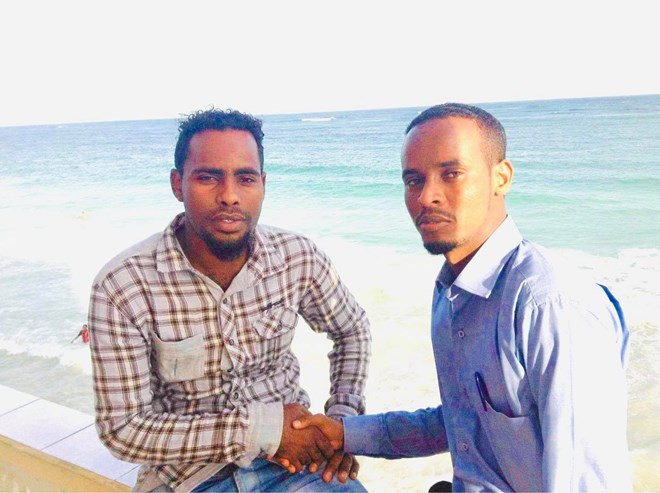Wednesday August 19, 2020
By Moulid Hujale
“Whatever happens, we should work for our country.”
I will always remember the words of my friend, who was killed in Mogadishu’s beachfront attack.
On this World Humanitarian Day, I celebrate and pay tribute to one of my best friends, Dahir Ali Gawl, 32, who dedicated his life to protecting Somali children. He was brutally killed in Sunday’s Elite Hotel attack in Mogadishu.
I first met Dahir in Dadaab refugee camp in Kenya around 2012, where he was studying an English course. A year later, we met again in Mogadishu, this time as dignified citizens proudly working to make Somalia a better place.
I worked with the Ministry of Education, and he worked with the Federal Ministry of Defence as Child Protection Coordinator.
His work involved training the Somali National Army on human rights and child protection. He was passionate about children’s rights and advocated for their education.
In mid-2013, I was new to the city and was looking for a flatshare in the so-called “Green Zone.” He lived in Via Liberia, Waberi district, one of the vibrant neighbourhoods in southwestern Mogadishu.
He offered me to move to his place, and we lived together for the following year and a half. I spent with him my best and worst times in Mogadishu. Together we swum in Jazeera beach, ate fresh fish in Liido and played soccer together in its sand but we also survived several explosions and attacks in the city.
Dahir was kind, always smiling and loved his country so much. He had political ambition and was determined to sacrifice his life for Somalia. In 2016, he went back to Garowe, Puntland where he was born to make a case for young people’s political participation.
As Somalia’s election tradition goes, local elders put the names of the federal MPs forward, so Dahir spent a lot of time convincing them to give him a chance in the general election. Unfortunately, he was let down by clan elders who don’t trust the ability of youth to represent their family’s interest in the National Assembly.
However, Dahir did not budge and returned to Mogadishu to continue his work of mainstreaming human rights and child protection across Somalia. In the last few months before his life was cut short, he has been travelling to different parts of the country, giving training to regional Somali armies.

SUPPLIED: The author, Moulid Hujale, with Dahir Ali
During our free time, especially on Fridays, Dahir and I used to go to the mosque, pray and then go to our favourite restaurant in Waberi to eat rice and fresh camel meat. In the evenings, we used to go to small roadside teashops to drink spicy tea as we enjoyed the open breeze and watch children play football in the street. It was safe and simple; we used to avoid going to the high-end fancy restaurants, which are usually high targets.
In the night when we return to our flat to sleep, I remember I used to close the windows, but he used to like them open. “Don’t you hear the gunshots outside, Dahir?” I would ask. “Don’t’ worry, I will defend you my brother because I work with the defence ministry,” he would reply, flippantly and we would both burst out laughing.
After I left Mogadishu, I used to call him every time I hear about explosions in the city to check on him and ask him about his whereabouts. He always said “Sxb Dalkaa loo shaqnayaa,” meaning, “I am working for my country, my friend.”
Unfortunately, on 16th August, he paid the ultimate price working for his beloved country. May your soul rest in Jannah-al-Firdaus.
Dahir is survived by a beautiful four-year-old daughter called Salma who lives in Canada.
As I conclude writing this short tribute, I will leave you with Dahir’s words #DalkaHalooShaqeeyo.